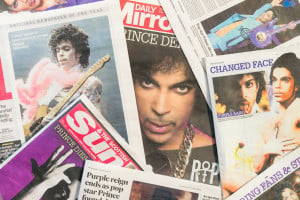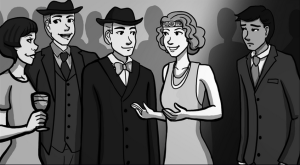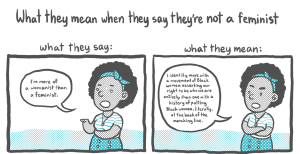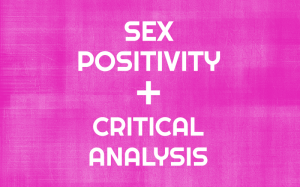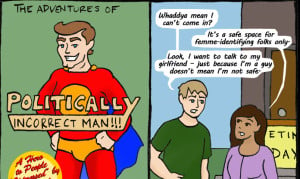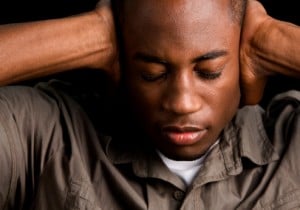How is it possible that we’re living in a world without Prince?
Like so many others, I was shocked and completely devastated by the news of his death. Prince means more to me than words could ever say – if you’re a fan like I am, you know simple language feels woefully inadequate for capturing his significance.
As I search to grasp the full meaning of his life and art, scrolling through tributes, videos, and memories of this unforgettable music icon, I’ve found some comfort in the fact that Prince never followed anyone else’s rules.
In fact, the theme of “transcending boundaries” keeps coming up in Prince tributes. He wasn’t limited by traditional ideas about gender or musical genres.
He broke all of society’s oppressive rules about what a man “should” be, and in the process, he helped so many of us discover and affirm our authentic selves.
Through his own uncompromising authenticity, he helped queer folks like me realize that we could express our queerness, our sexuality, our gender/s, our flamboyance – without shame.
And for us Black folks, his unapologetic Blackness paired with his unapologetic “differentness” was a rare reminder that we are each gloriously unique, none of us fitting society’s preconceived notions of what being Black “should” mean. And that not only is our uniqueness okay – it’s magnificently sexy.
Prince’s presence and visibility in the world let us know that we deserve to be our most bold selves, and still be proudly Black. He celebrated his Blackness with every performance, every song, and every outfit, and it was clearly political. He showed his afrocentricity with seduction, with sensuality, with electrifying eroticism, and allowed it to be a critical part of how he moved in the world.
I hope you didn’t forget that part about him. Don’t get me wrong, I love that Prince transcended boundaries – but it’s critically important that you recognize his race.
He is not “post-racial.”
He’s not someone whose identity exists “beyond race.” He did not transcend race, but his art and presentation surely transcended the impacts and limitations of internalized racism.
As Damon Young put it at Very Smart Brothas, “Prince was unapologetically Black before it was cool to be so.”
You might be skeptical about emphasizing Prince’s race. It’s a good thing, of course, that Prince can reach across racial lines to connect with all kinds of people. He’s the kind of artist who reminds us of what we all have in common, unites us under the shared love of damn good music and inspiring artistry.
A person like that can help us remember that we have to stop mistreating each other because of our differences and just treat each other with compassion. Our world could always use more compassion.
But we don’t have to erase Prince’s race in order to get it.
If we don’t recognize his race, we’re actually doing a great disservice to him and to the legacy he leaves behind for Black folks.
It’s not that his legacy only belongs to Black folks – of course he means a lot to people from all kinds of backgrounds, and that’s awesome.
The problem is when we decide that someone can be “successful enough,” desirable enough, admirable enough that they no longer “count” as Black.
This attitude can start from a good place – wanting to recognize someone’s full humanity, to admire all of who they are instead of “limiting” them to their race.
You’ve probably come across the idea that it’s a good thing to perceive someone beyond the boundaries of their race. Defining a person by their race can mean that you’re stereotyping them, discriminating against them, or ignoring all of the other parts of who they are.
But it shouldn’t have to be that way. Even when an artist like Prince defies the stereotypes of what being Black is “supposed” to mean, they are still Black.
Taking a “colorblind” approach to their identity doesn’t honor them – it only erases an important part of who they really are.
So, while you may have good intentions when describing Prince as “post-racial,” honoring his memory really means that you must recognize his Blackness. If you don’t, then you’re actually just following anti-Black patterns of treating Blackness as undesirable – and saying that the only way to admire a Black person is to not see them as Black at all.
At the end of the day, it just drives home the harmful misconception that Blackness only fits a certain stereotype, so a Black person existing outside of that stereotype shouldn’t be perceived as Black.
But here are a few reasons why we must recognize that Prince and other “unconventional” Black folks are, in fact, still Black.
1. Society Has No Problem Calling Celebrities Black When They’ve Done Something ‘Wrong’
If you pay attention to the patterns of which Black celebrities are said to “transcend race” and which ones the general public perceives as Black, you’ll notice how much these categories are based on anti-Blackness.
Think, for instance, of when Beyoncé’s criticized as being “too raunchy.” Or when Kanye West is seen as “cocky.” Or when Nicki Minaj is described not as a talented artist and strong self-advocate, but as “ghetto,” and when Marshawn Lynch is perceived not as a passionate, introverted athlete, but as a “thug.”
In these instances, there is no doubt in the public’s mind that these people are Black.
When Black celebrities can be associated with racist stereotypes – like having animalistic sexuality, violent tendencies, and a “savage” nature – people don’t say anything about them “transcending race.”
All of these figures I’ve mentioned are complex human beings – not just the stereotypes the mainstream media tries to reduce them to.
But when a Black public figure like Prince emerges and makes it impossible to reduce him to any racial stereotypes, suddenly, people are eager to say he’s beyond race or Blackness. Similarly, the same people will accuse Black people of reverse racism when we celebrate or claim that public figure’s Blackness.
Can you see how this can create harmful associations in your mind? You’re taught to associate Blackness with all of the things white supremacy says is ugly about us, like being inherently violent and “uncivilized.”
You’re taught that Black folks aren’t complex beings – if we do have depth beyond stereotypical images, then that must mean we’re not really Black.
But Black weirdos exist, yo. You wouldn’t be reading this article if we didn’t, because I am a Black weirdo through and through.
In a world that tries to portray us based only on degrading stereotypes, it’s absolutely vital for us to have representation of “unconventional” Black folks like Prince. Complexity is not just for white folks, and we need reflections of our diverse ways of existing.
Blackness exists in many different forms, and Prince was an example of that. Black weirdos like me need to world to remember this, so that we can have space to affirm ourselves and be respected by others who recognize our whole, authentic selves.
2. ‘Colorblind’ Approaches to Race Just Mean Valuing Whiteness Over Other Racial Identities
Even though some people are erasing Prince’s race, most of them are using nothing but well-meaning language when they do it.
It’s great that Prince can unite us in the sense that everyone’s invited to appreciate his art, regardless of race.
What’s not so great is when we follow the belief that the only way to show each other respect is to pretend we “don’t see race.” If you think not seeing Prince’s Blackness is a good thing, you might be falling for the idea that Blackness is a bad thing.
Even though the United States is a multicultural nation, we’re not living in a “post-racial” society. It’s clear that white culture is considered the norm, and people who conform to the dominant white culture are valued more than people of color – especially when people of color are following our cultural traditions that differ from what white culture considers “normal.”
If you have any doubt, just look at pop culture.
For example, Black artists in traditionally Black genres like hip-hop are continuously dismissed as “thugs,” and not recognized as real artists by mainstream media institutions. But those same institutions seem to have endless attention, money, and awards to give to white artists who adopt hip-hop-inspired styles and music.
In subtle ways, the people who claim not to “see race” actually end up prioritizing whiteness.
What you’re really doing is trying to see everyone as the same. You’d like us all to conform to the dominant (white) culture’s norms, and you’re seeing difference from that norm as something negative.
It’s possible for someone to be both Black and great. If you acknowledge that Prince is both, then you’re helping reject the racist idea that someone who’s “ethnic” can’t achieve great things.
3. Society Teaches Black Folks We Have to Overcome Our Blackness to Be Valued
You may have all the best intentions when you don’t “see” successful or unconventional Black people like Prince as Black. But the ultimate impact is that, from the time we’re children, Black folks are being told that our Blackness is incompatible with success – so it’s something we have to “overcome” in order to achieve anything.
The truth is that Blackness will always be part of us, and the more we’re told that we should aim to “overcome” it, the more we become ashamed of who we really are.
I’ve never been able to figure out how to respond when someone tells me they “don’t see me as a Black.” Most of the time, I’ve heard this from people who mean it as a compliment, and compliment etiquette would encourage me to reply with “thank you.”
But gratitude is not exactly what I’m feeling when someone thinks that being perceived as “not really Black” is a good thing.
I’ve felt shame, and confusion, and these days, usually some anger at these words, but grateful? Nah – why should I be grateful for someone erasing an essential part of who I am?
Here’s a short sample of the reasons white people have told me they don’t really “see me as Black:” Because I speak “properly.” Because I like to read. Because I love science fiction. Because my favorite music includes genres that aren’t rap or hip-hop. Because they don’t usually find Black people attractive, but I’m “pretty for a Black girl.”
And a sample of moments when white people have no trouble seeing me as Black: When they think I’m shoplifting. When they think I’m “too sexual.” When I’m angry. When I talk about race and racism (especially if I’m not “nice” about it).
Do you see the pattern? When I’m being a real human being, and not just a stereotype, people think I’m an exception to the rule of what Black people are really like. When I’m following patterns of speech and behavior that the dominant white culture approves of, I’m considered “respectable” – which translates to “not Black.”
But if I’m making white folks uncomfortable, and standing up for myself or my community, they choose not to ignore my race.
This reveals the disturbing truth that one way to discredit a Black person in this society is to simply recognize their Blackness.
Prince deserves better than that, and I do, too. That’s why, in remembering him, I’m emphasizing his Blackness – because the dominant trend is to reject it, simply because he defied racist stereotypes and achieved great things.
4. Even ‘Positive’ Stereotypes About Black People Are Hurting Us
You can understand why it’s hard to be associated with negative stereotypes like being inherently violent.
But you should also know that even so-called “positive” stereotypes can cause a lot of harm. And Prince managed to defy those, too.
Consider the moments when mainstream culture “accepts” Black people, and you’ll notice that it’s usually when we provide some form of entertainment.
It’s when we’re goofy, one-dimensional sidekicks for heroic white characters in the media. Or we’re strong, hypermasculine athletes (who perform well and definitely don’t ever talk about race).
Even if it’s a “positive” stereotype – like believing all Black folks are funny or good at sports – it puts us in a box, instead of letting us be full human beings.
These stereotypes also don’t set the bar very high for us. We’re supposed to be shallow and entertaining for white folks, instead of being real people with real lives and feelings.
Prince surpassed that bar like it was nobody’s business. He’s nobody’s sidekick or comic relief. He’s a star in his own right, with the spotlight shining brightly on him.
He provided entertainment as an artist, sure, but he certainly didn’t stick to the dehumanizing roles that society demands from Black entertainers.
And offstage, he was notorious for keeping to himself. As a shy introvert, I can tell you that Black folks aren’t allowed to simply be shy. If we’re quiet, we’re seen as “dangerous,” “threatening,” or having “nothing intelligent to say” – not as quirky and shy like white folks get to be.
The public expects us to entertain them, to be non-threatening caricatures instead of real people. This culture of white supremacy demands that we give white people what they want from us and silence the rest.
The music industry, for instance, routinely denies Black artists compensation or credit for their work. But when that began to happen to Prince, he stood up to the pressure, fought for the rights to his work, and refused to let others steal and profit from it.
Showing up to look out for himself and his community instead of just being an entertaining character is not what society wants or expects from a Black man.
That’s part of what makes Prince’s full story essential for Black folks to have. We need to know that it’s possible to show up as our full selves in the world – and to fight for, and win, our right to show up this way.
5. Blackness Mattered to Prince
It can be difficult to grasp how you can hurt someone by applying “positive” stereotypes to them or avoiding recognizing their race at all – especially when you just have good intentions in doing so.
To understand how you could have good intentions and still cause harm, you have to know how white supremacy operates. It’s one of many oppressive systems, like the patriarchy, that sets the status quo in the US.
So without thinking critically about how you approach race, you can end up unintentionally following and perpetuating white supremacy – even if you don’t mean to be racist.
It takes time to understand the influence of white supremacy, and I don’t expect you to master the concept today. But one thing we can do today is honor Prince’s memory.
And there’s no way to honor Prince without affirming his Blackness – because being Black mattered to Prince.
His political activism showed up in his music, like the song “Dear Mr. Man,” which featured activist and philosopher Dr. Cornel West. And in his quiet humanitarian work for poor communities of color.
And in his own words, like when he said at the 2015 Grammys, “Albums, like books and Black lives, still matter.”
Prince seemed untouchable in many ways, but just like the rest of us, even he couldn’t escape the pain of white supremacy. So affirming the beauty of Blackness and challenging racism was deeply important to Prince.
If people of many different backgrounds can unite over our love of Prince, then we can also come together to honor him as he would have wanted.
And that includes recognizing and rejecting white supremacy, and celebrating the full and beautiful breadth of Blackness.
If we don’t, you know he’ll be throwing shade at us from wherever he is right now. I don’t know about you, but I sure as hell don’t want to get caught by that side eye.
***
Transcending boundaries – hell yeah, Prince Rogers Nelson did that. No gender role or genre or stereotype could pin him down.
But transcending Blackness? That’s not what Prince did – and he never would have wanted to.
The world needs Prince, including all of his unapologetic Blackness. We need public figures who give a damn about eradicating racism. We need media visibility for the dynamic sides of Blackness that defy racial stereotypes.
We need hope for Black folks who are artistic, shy, genderqueer, struggling through internalized racism, trying to carve a space for themselves in a world that tries to shut them out, and more.
Prince may have moved on from this realm of living, but we still have his spirit, his style, his art, and the memory of his presence to inspire us just as he did when he was alive.
When he was alive. I can’t believe I just wrote those words about Prince, and now I’m off to wallow in my grief and wail along to “Purple Rain” again.
I was lucky enough to see Prince in concert once. Thanks to Van Jones, now I know that he came to play in places like Oakland partly to support community groups here.
So I got the chance to see the one and only Purple One in person, as an artist, only because he was also more than a performing artist – he was a Black man who cared about his community.
Let’s never forget that essential part of his memory.
[do_widget id=’text-101′]
Maisha Z. Johnson is the Digital Content Associate and Staff Writer of Everyday Feminism. You can find her writing at the intersections and shamelessly indulging in her obsession with pop culture around the web. Maisha’s past work includes Community United Against Violence (CUAV), the nation’s oldest LGBTQ anti-violence organization, and Fired Up!, a program of California Coalition for Women Prisoners. Through her own project, Inkblot Arts, Maisha taps into the creative arts and digital media to amplify the voices of those often silenced. Like her on Facebook or follow her on Twitter @mzjwords.
Search our 3000+ articles!
Read our articles about:
Our online racial justice training
Used by hundreds of universities, non-profits, and businesses.
Click to learn more


